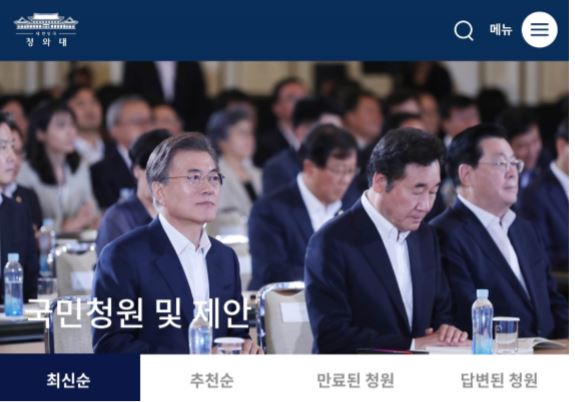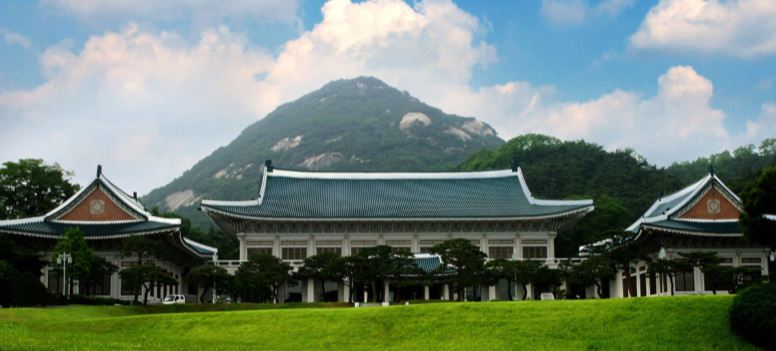
Recall your school days. Do you remember the class discussions to plan for a good year with new friends and teachers? What were the meetings like? In general, students freely exchange suggestions about changes they wish to see in class and rules made accordingly. A meeting similar to those class discussions is operating nationally. It was first created on the official Cheongwadae website as ‘The National Petition Board’, which is a portal for South Korean citizens to have their voices heard by the government. The platform immediately attracted the attention of the people. However, the more attention it received, the more problems it created.

The Right to Petition
‘The National Petition Board’ was created by President Moon Jae-in to celebrate his hundredth day of inauguration. It is a communication tool between the government and the people, allowing any South Korean citizen to propose ideas. As the first of its kind, it certainly grabbed the attention of a lot of people. In fact, on average, there are approximately 430 petitions uploaded daily, which clearly shows the interest of the people.1) President Moon Jae-in communicates with the public on various platforms, which he hopes strengthens his promise to stay connected and have an interactive administration. He made it clear that he is going to convert the Korean government into a form of rule that is communicative by establishing the YouTube channel ‘Cheongwadae of South Korea’, starting full disclosure of national reports, and appointing the Minister of Communication. In terms of national reporting, Moon offers regular question and answer sessions between citizens and Ministers, including himself. Then, President Moon established ‘The National Petition Board’ as a tool to supplement representation of the people during his administration. It has even grown more popular than the ‘We the People’ policy supplication board created by Former U.S. President Barack Obama, which was opened on the official White House website. People are encouraged to upload petitions as well as to agree with previously uploaded petitions. If the number of agreements by the public reaches 200,000 in thirty days, government authorities are required to officially respond to the particular petition through the Cheongwadae website and YouTube channel. President Moon has also instructed his administration to comment on each petition briefly, believing in the importance of all submitted petitions regardless of the 200,000 mark. As of May 16, twenty-six petitions have been answered. Although ‘The National Petition Board’ does have its merits such as increasing political interest and participation in government affairs of the people, it also has a dark side. In other words, it is degenerating in some ways. There was a petition after this year’s Winter Olympics calling for the revoking of Lee Seunghoon, an Olympic gold medalist, of his right to represent South Korea and the gold medal from the mass start game, which is just one example. Petitions should be authentic federal issues that offer plausible solutions to chronic problems in the nation. That is to say, a number of the petitions highlight the ignorance of Koreans towards core problems and the original purpose of the petition board. Problems like these are causing people to lose faith in the board. Moreover, people are constantly worrying about the possibility of cyber abuse and some are even claiming that the board has turned into an open space for unreasonable demands.

Is It Right?
One of the most serious problems is that a large portion of petitions that are being uploaded are unrelated to current Administration issues. “Cheongwadae’s direct communication upholds the idea ‘when the people ask, the government answers’. For petitions related to recent government issues and supported by more than 200,000 people within a thirty-day period, the government and Cheongwadae will respond.” As the notice on ‘The National Petition Board’ website clearly states, petitions should be linked with current government issues. However, often, petitions have little or nothing to do with current government issues, and inappropriate petitions are frequently posted. Regrettably, many of these petitions do not have any other purpose except to target a certain individual, which can aggravate social unrest and bring about emotional conflict. As mentioned previously, the petition associated with speed skater Lee Seunghoon is a prime example. On April 8, the petition titled, “Requesting Immediate Investigation of the Korea Skating Union Including Jin Myeong-gyu and Baek Cheolgi” was uploaded on ‘The National Petition Board’. The petition, however, included statements about revoking Lee Seunghoon’s gold medal for ‘unfair’ conduct during a game. The petition went to say, “Despite his talent for speed-skating, which itself is worth a gold medal, behind every player exists unfair support of the Korea Skating Union. People have the right to expect each sport to be played fairly. Therefore, there is a need to revoke his gold medal, for he earned it unjustly.” The petitioner does admit it is not for the government to decide an athlete’s fate regarding disqualification from participating on the national team and the revoking of a gold medal. Then, why did the petitioner post this on the board? The freedom to voice one’s ideas is important, but it is just as important to voice them in the right situation. This was not an issue for the federal government to solve. Another drawback to the petition board was found earlier this year. A single individual voted to agree with a particular petition more than once. This violates the ‘one person, one vote’ regulation common to a democratic society. When a single person has the right to vote in support of something multiple times, the petition becomes laced with ill intent, allowing people to be only concerned with their personal political or social beliefs. In the end, the result will be a petition board overflowing with bias and unfair petitions. On February 5, a petition suggesting feminism education to become mandatory in all levels of education from elementary, to middle, and high school received 213,219 votes of support within the thirty-day period. It met all requirements that warranted an official response from the government.2) However, the issue with this petition was that the number of votes in support of the petition rose abnormally fast to reach 200,000 during the last several hours of the thirtieth day. This was the incident that brought about unrest and uproar, saying that it is not fair for one person to be able to vote more than once in support of a petition through various platforms like creating different Twitter accounts or changing the account settings on KakaoTalk. It is possible to show support for petitions by logging onto one’s Facebook, Twitter, Naver, or Kakao account, but an investigation showed that most votings were done through Twitter accounts (21.8%). Compared to the 2.4% of votes made on Twitter for a petition to reinforce the sentence of a minor guilty of sexual violence with similar number of participants, 21.8% clearly shows fabrication.3) Regardless of a petition’s importance, basic rules should be kept.

Towards the Right Direction
First and foremost, petitioners must foster a mature attitude towards politics. Only when appropriate government-related issue petitions are uploaded on the petition board it will be easier to make clear well-informed decisions. Besides, this will make it much easier for the government to see the needs of the people and respond to petitions fittingly. People should also recognize that Cheongwadae does not fall under the legislative branch, so it is improper for citizens to petition for such things as the ‘legalization of homosexual marriage’ or the ‘revoking of an athlete’s medal’ on the board. The petition board was created to hear the voices of the people, so citizens should upload reasonable petitions that are appropriate to be addressed by the government. While it will be difficult for an unreasonable petition to earn more than 200,000 votes in the first place, there still needs to be respect between the people and the government. Although citizens upload petitions irrelevant to current government issues or petitions that cannot be answered by the government as they are unrelated to federal jurisdiction, the government or Cheongwadae could reply by identifying the reasons why they cannot be answered. By doing this briefly, government officials would be demonstrating and discouraging inappropriate petition uploads, possibly decreasing their numbers. To address the issue of unfair voting procedures, ‘The National Petition Board’ could remove its anonymity policy. In the case of ‘We the People’, the petition board of the U.S. White House, people must create an account prior to having access to the site. Like this, requiring people to register on the site using their real names and personal information to gain access would certainly reduce the ability of a single individual voting repeatedly. Lee Yongho, a member of Congress, pointed out flaws with ‘The National Petition Board’ saying, “Constitutional values and policies have been weaken due to public opinion. Repeated voting on the petition board shows an example of this already happening in our society. As of this issue, the government should take on criticism more seriously. The board should adopt new policies, especially ones that require partial or full disclosure of a person’s name or at least the person’s username. With these new policy changes, the issue of recurring voting will be largely resolved.”4) The adoption of a new policy requiring verification of one’s personal identity may not only resolve the problem of irrational voting, but also inculcate responsibility in people on what they say and agree to. Noticing the seriousness of the problem, Cheongwadae has admitted fault in its system to some degree. It has blocked the uploading of petitions and voting through Kakao accounts, which has been determined to be one of the ways of repetitive voting.
Rights, Use Them Right
Jean Jacques Rousseau has once said, “The people of England regards itself as free; but it is grossly mistaken; it is free only during the election of members of parliament. As soon as they are elected, slavery overtakes it is nothing." The same thing can be said about South Korea. After emerging from the darkness with candle lights, a period of communication and unification between the government and the people has arrived. Now is the time for people to speak up for themselves through ‘The National Petition Board’, but they should make ethical use of it. What makes a democracy is freedom, and virtue is the only way to earn it.
1) “Reply, Cheongwadae: 2017 National Petitions and Suggestions”, KTV, November 14, 2017
2) Hong Taehwa, “’One Person Able to Vote in Support of a Petition Unlimited Times’ Controversy Arises Regarding the Fairness of The National Petition Board”, Seoul Economics Daily, February 6, 2018
3) Same as 2
4) Go Sang-gyu, “Cheongwadae’s National Petition Board Gone Bad…The Real Name System Has to Be Adopted”, Asia News Agency, February 22, 2018
Kim Hong Taeeun
smt_tek@sookmyung.ac.kr
Kim Shin Hyerin
smt_shr@sookmyung.ac.kr


